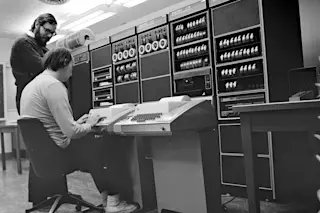In August, Google set rumor mills spinning when it quietly unveiled an operating system built from scratch. The OS is an open-source project called Fuchsia, and the company has been mum about how it plans to use it. “Fuchsia is a new open-source project that is not at all related to Android or Chrome OS,” says Google rep Joshua Cruz.
Kernels are the central part of an operating system, interfacing between software and hardware. | Dan Bishop/Discover after Kernel_Layout via Wikimedia Commons
The operating systems that drive modern computers originated decades ago. Apple’s OS is based on Unix, first built in 1969. Android uses Linux, developed in the early ’90s. But devices are changing, and those workhorse systems may not be the best fit for cloud computing or the Internet of Things, where companies add connectivity to everyday devices from refrigerators to streetlamps. As a result, “we’re now seeing an ...















